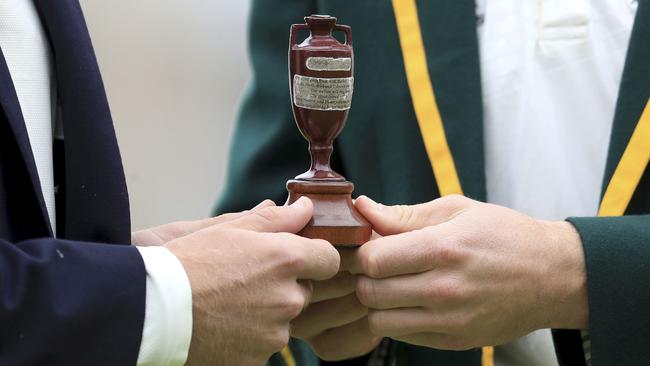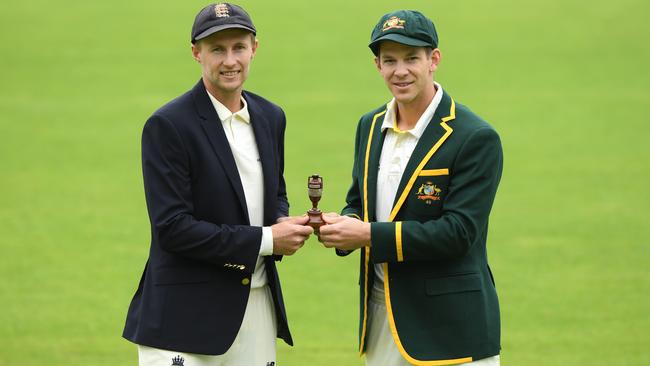
These are the days you live for, of course. All the training, the long hours beating up the body, the endless practice, the sessions on the bowling machine, the travelling up and down the motorway, the commitment to excellence, the sacrifices made and borne, but, still, that anxiety and fear nags and gnaws at the soul. What, after all this, if you are not quite up to it?
There are some old hands playing today, who have been here before and know the drill. Jimmy Anderson is playing his 32nd Ashes Test, Stuart Broad his 28th. When Joe Root looks around the dressing room this morning, he knows these senior players have what it takes. They will be lifted not cowed by the occasion. Ben Stokes, recently returned to the vice-captaincy, is the type a captain wants alongside him. In any Ashes contest, you need a core of these players — experienced, hardened competitors. Leaders.
Experience, knowledge
For Australia, the venerable Peter Siddle returns to the squad, and possibly the starting 11, a decade after he first played an Ashes Test in Cardiff. If he plays — and in the absence of Mitchell Marsh Australia will need someone to bowl long spells — this will be his 22nd Ashes appearance. David Warner and Steve Smith boast 43 Ashes Tests between them, experience that will hold them steady as they return to Test cricket, and a hostile reception, after an enforced sabbatical.

There is experience and knowledge everywhere you look.
Equally, there are those for whom a first Ashes experience is only an hour or two away. Jason Roy, Rory Burns and Joe Denly for England.
Travis Head and Matthew Wade for Australia. Spare a thought for them this morning. The eggs may not slip down quite so easily; the coffee might taste slightly more bitter than usual. All top-class sport requires courage of its protagonists, as they bare their weaknesses to the world. The Ashes most of all, perhaps.
The most challenging cricket of all
What lies in store for all these players, young and old, Ashes veterans or virgins, is the most intense experience of their cricketing lives. This series is scheduled to last 46 days which, in modern sport, sounds a stretch but in the history of Ashes cricket is a short, sharp burst.
A five-Test series is the most challenging cricket of all because it allows the opportunity to find weaknesses in opponents, from which there is no hiding, unless the selectors take pity by removing a player from the contest.
Those vulnerable of method or mind will be found out.
The intense schedules, and the sharp divergence of conditions between England and Australia, is the main reason why recent Ashes series have gone not with form but with home advantage. How, some may wonder, can England win 3-2 in 2013, 3-0 in 2015 — both series at home — but in between in 2013-14 be whitewashed 5-0 down under? On the face of it there is no logic to that, until you recognise that, of all games, cricket is most determined by the peculiar conditions that prevail. Dukes ball, Kookabarra ball; cloudy overheads, hot sun; softer pitches, hard decks. These are fundamental differences.
So that must be the starting point for this series.
Australia’s 18-year wait
Since 2001, the last time Australia won in England, every series has gone to the home side, with only one exception.
Andrew Strauss’s team’s victory in Australia in 2010-11, by three victories of an innings, stood as a monumental achievement at the time, the more so since given the strength of home advantage in recent years. Given Australia’s long advantage in the wilderness years 1989-2005, it would have been remarkable to think that Australia would not win a series on English soil for 18 years and counting, but that is where we stand now.
Another feature of recent series has been how uncompetitive the scorelines have been. None since 2001, bar the epic series of 2005, has gone down to the wire. The squeeze on schedules means that once a team gets on a roll, it is very difficult to withstand the avalanche, as there is no time for players to rediscover form outside of the Tests. So, while the cricket has often seemed highly competitive, the end scoreline has not often reflected that.

The first Test, then, shapes as critical. This is why England have chosen to play it at Edgbaston, where they have a fine record and where Australia have not won a match of any type since 2001, when their mentor, Steve Waugh, was captain and their coach, Justin Langer, was running drinks. The atmosphere will be febrile and hostile and to England’s advantage, although it has been overplayed. It is not the vagaries of the ground or pitch or atmosphere that has been defining at Edgbaston, rather that Australia’s team has not been as strong since as it was then.
After two days of rain, the pitch was given a chance to breathe yesterday, and it showed white and hard, with 8mm of grass on top, the same amount as in 2015, when Anderson took six wickets in the first innings and Steven Finn, returning to the team, took six in the second. Anderson, 37 years young and going strong, has recovered from his calf injury and will continue his remarkable career, although his lack of game time has encouraged the selectors to give Jofra Archer more time to recover from a side strain.
Understandably, they don’t want to risk two bowlers coming back from injury. Sam Curran, Olly Stone and Archer miss out.
Archer was a star of the World Cup and will surely play at some point in the series, a likelihood that applies to Mitchell Starc, also a star of the World Cup and also likely to miss out here.
Starc is a bowler who blows hot and cold — more hot than cold — and by giving him time to recover from exertions in the World Cup, Australia will save him up for the Lord’s slope. The intense schedule will require a squad of fast bowlers and the need to rotate. Australia’s choice for the final 11 here rests between Josh Hazlewood and Siddle.
Both sides shape as powerful with the ball, more vulnerable with the bat. All those mentioned earlier, nervous at breakfast this morning as they contemplate their first Ashes Test, are batsmen: three of England’s top four, and two of Australia’s middle order. These are the most vulnerable points for both teams, England with their fourth opening partnership in the past five Tests, Australia with a potentially soft underbelly.
Runs will be at a premium most likely, so go looking to the giants. Root marked his last Ashes series at home with a superb hundred in the first Test at Cardiff. That was at number five. He will walk out at three this week and is captain, too, a burden that will challenge him. Smith and Warner stand out for Australia, outstanding players both. Ashes heroes can spring from obscurity, but in this contest of all contests, it pays to side with the best players and the strongest characters. The next six weeks will reveal who they are.
* Catch all the Ashes action on our LIVE BLOG tonight, and throughout the First Test.
The Times




There is nothing quite like it, the first morning of an Ashes series. None of the players will have slept well. A combination of excitement, anticipation, fear and just enough dread will have kept the heart and the head working overtime, into the long, dark hours, fitful bursts of sleep just about the most anyone can manage.